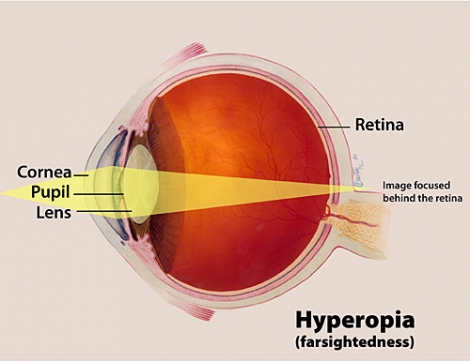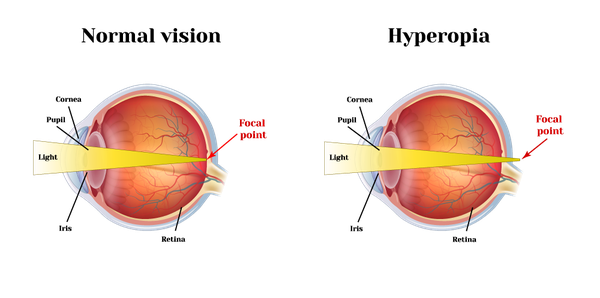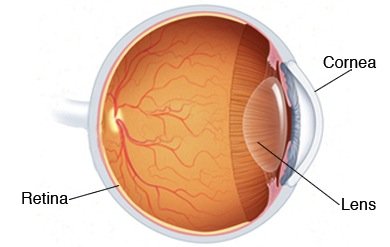Hyperopia

Far-sightedness / Long-sightedness
Hyperopia is a common vision condition in which you can see distant objects clearly, but objects nearby may be blurry.
The degree of your farsightedness influences your focusing ability. People with severe farsightedness may struggle to see objects at distance and near, while those with mild farsightedness may be able to clearly see objects in the distance but struggle with anything closer.
Farsightedness can be present from birth and tends to run in families.

Symptoms
Symptoms may include:
- Nearby objects may appear blurry

- You need to squint to see clearly
- You have eyestrain, including burning eyes, and aching in or around the eyes
- You experience general eye discomfort or a headache after a prolonged interval of conducting close tasks, such as reading, writing, computer work or drawing
Causes
Anatomy of the eye
Your eye has two parts that focus images:
- The cornea is the clear, dome-shaped front surface of your eye.
- The lens is a clear structure behind the pupil of your eye.
In a normally shaped eye, each of these focusing elements has a perfectly smooth curvature. A cornea and lens with such curvature bend (refract) all incoming light to make a sharply focused image directly on the retina, at the back of your eye.

A refractive error
If your cornea or lens isn't evenly and smoothly curved, light rays aren't refracted properly, and you have a refractive error.
Farsightedness occurs when your eyeball is shorter than normal or your cornea is curved too little. Instead of being focused precisely on your retina, light is focused behind your retina
Complications
Hyperopia can be associated with several problems, such as:
- Crossed eyes. Some children with farsightedness may develop crossed eyes or turns in the eye. Specially designed eyeglasses that correct for part or all of the farsightedness may effectively treat this problem.
- Reduced quality of life. Uncorrected farsightedness can affect your quality of life. You might not be able to perform a task as well as you wish. And your limited vision may detract from your enjoyment of day-to-day activities.
- Eyestrain. Uncorrected farsightedness may cause you to squint or strain your eyes to maintain focus. This can lead to eyestrain and headaches.
When to see a doctor
If your degree of farsightedness is pronounced enough that you can't perform a task as well as you wish, or if your quality of vision detracts from your enjoyment of activities, you should organise an eye examination.
If you have any concerns about your own or your child’s eyes or suspect they may be long sighted – Please don’t hesitate to contact the clinic on 021 4341030 or bgolchin@corkeyeclinic.ie







